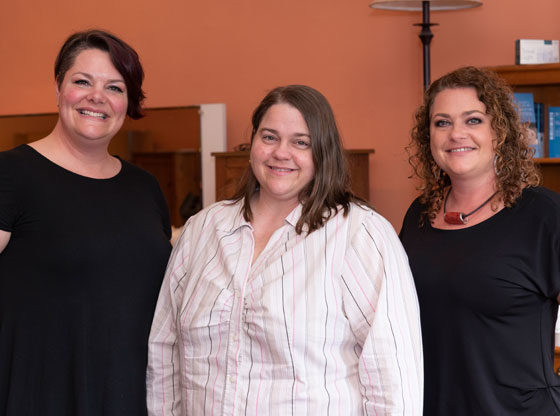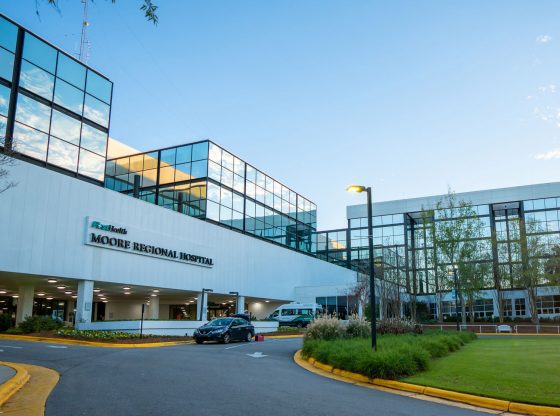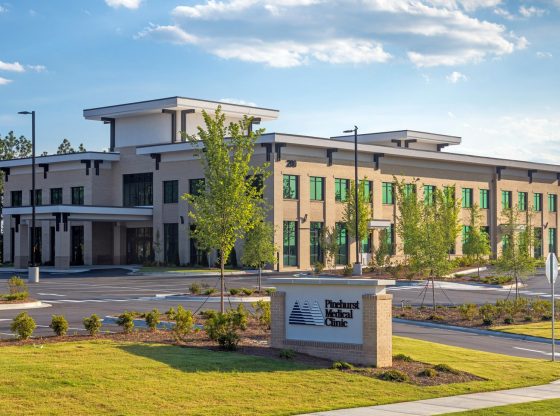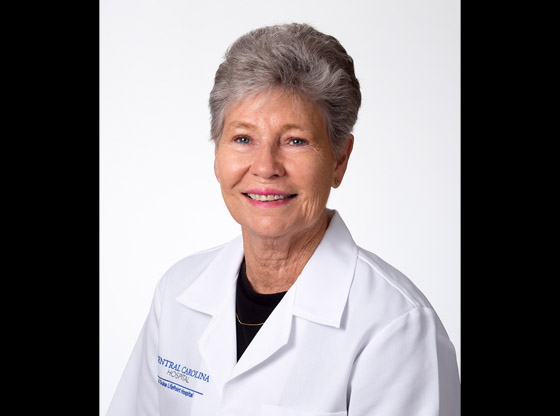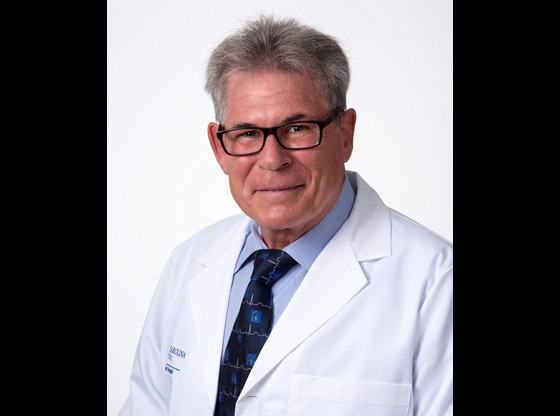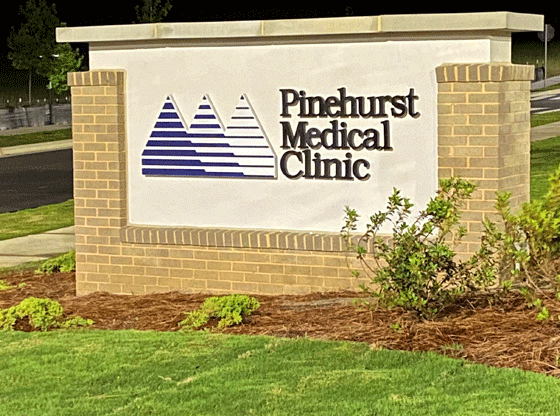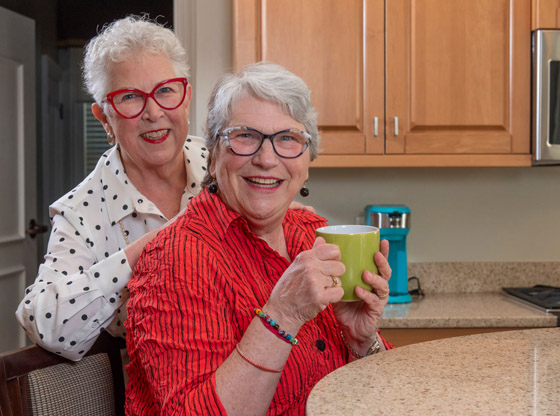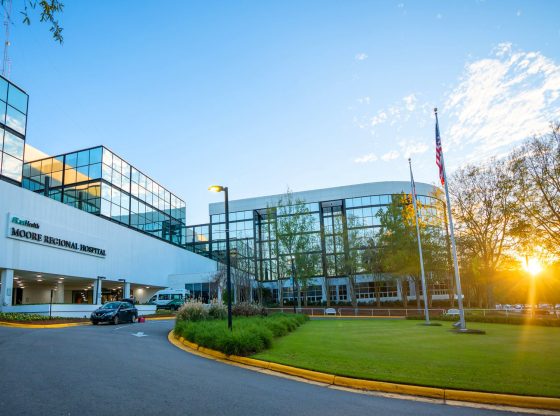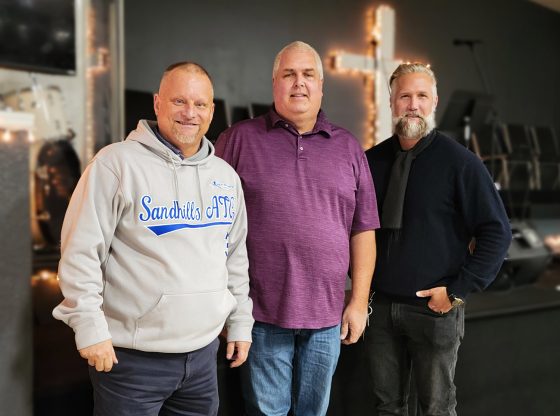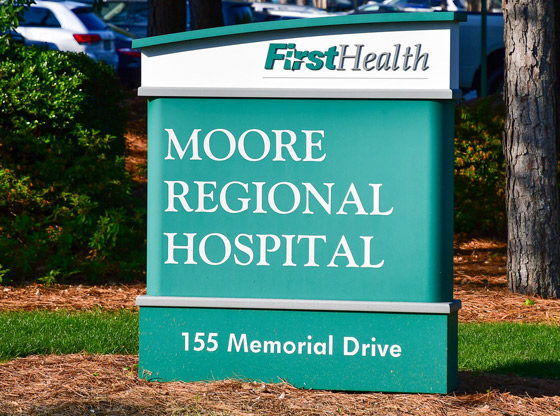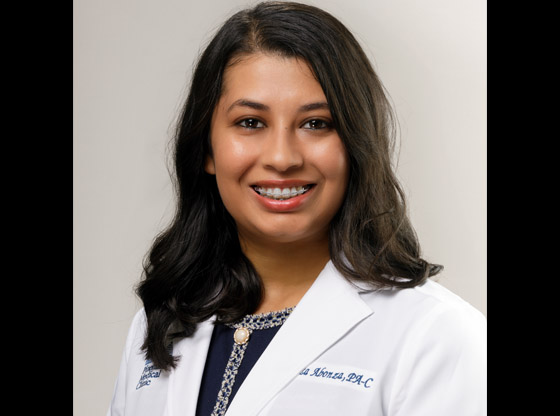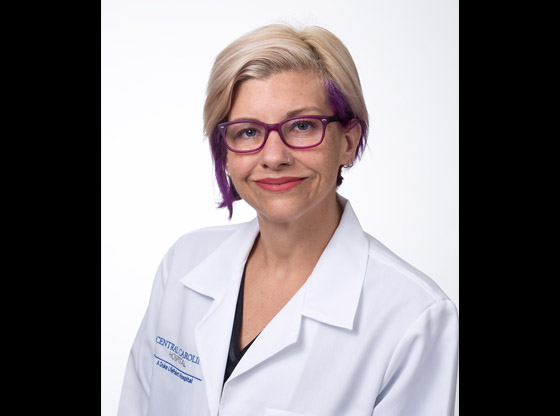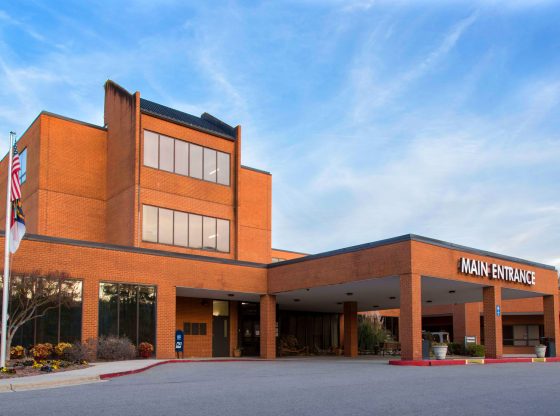Colorectal cancer is a leading cause of cancer death for both men and women in the United States and is often well underway before symptoms appear. To help people better understand and prevent the disease, FirstHealth joins efforts around the nation as part of National Colorectal Cancer Awareness Month in March.
In particular, FirstHealth patient and colorectal cancer survivor Amanda Garner shared her story to help others get ahead of the disease before it takes hold.
At age 40 in 2017, colorectal cancer was the farthest thing from Garner’s mind. A bubbly kitchen manager with a husband and three children, the Eagle Springs native hopped from work to numerous family activities with ease.
Then she started bleeding from her rectum and saw blood in her stool. She followed her physician’s recommendations to alter her diet, but that didn’t stop it. She was just 40 years old—younger than the usual age to start screening for colorectal cancer— so that disease wasn’t likely, but her physicians recommended a colonoscopy. This is a screening that can find and remove polyps in the colon and rectum in the early stages of cancer, or before they can turn into cancer.
The diagnosis: stage 3 colorectal cancer. “I was devastated,” said Garner. “I didn’t know which way to go.”
Fortunately, an army of health care providers did. “Colorectal cancer can often be cured if detected early,” said Garner’s oncologist, Todd Moore, M.D. of FirstHealth of the Carolinas and Pinehurst Medical Clinic. “I’m so glad Amanda’s case was detected early, and we could work together to treat it.”
Garner underwent removal of a portion of her colon and then an ileostomy. She also partnered with Moore, whom she referred to as her “gentle giant” in a protocol of chemotherapy and radiation. “Attitude is everything when doing this,” Garner said of the difficult treatments that left her weary and sometimes got her down. “You have to take things in a positive stride.”
But even the most positive people need a pick-me-up, and Garner found that and more with FirstHealth Cancer Services, funded in large part by the Foundation of FirstHealth’s Cancer CARE Fund. “When going through chemo, sometimes I looked in the mirror and couldn’t recognize myself,” said Garner. “Then I was invited to a day of pampering for ladies going through cancer. A wonderful woman showed us how to use makeup, and I truly felt like a princess for a day.”
The Cancer CARE Fund also supported Garner and her family with gas money to help defray costs of traveling back and forth to the hospital. “Chemo compromised my immune system, so I had to quit working. Finances were tight.” Garner also worked with a FirstHealth financial navigator to help understand programs that could provide additional assistance. “No one will never know how FirstHealth’s services helped my family and me.”
Additionally, Garner spoke with a colorectal cancer survivor through FirstHealth’s CARE-Net service. “It was comforting to talk with someone who had been through this before,” said Garner. She plans on joining the CARE-Net team of volunteers to be an encouragement to others.
Another form of encouragement Garner readily provides now is the power of colorectal cancer awareness. “As soon as you experience something that’s not normal, get it checked,” she said. While Garner’s early symptoms included bleeding and blood in her stool, other symptoms can be feelings of needing to have a bowel movement that’s not relieved when using the restroom, cramping or abdominal pain, unintended weight loss and weakness or tiredness.
While there is no sure way to avoid colorectal cancer, FirstHealth joins the American Cancer Society in recommending these general actions to help lower risk:
Age 45 to 75? Time to get screened. Regular colorectal cancer screening—the process of looking for cancer or pre-cancer in people who have no symptoms—is one of the most powerful ways to prevent colorectal cancer before it starts. Several types of tests are available. While screening is recommended for people starting at age 45, those with a family history of colorectal cancer or those with known inflammatory bowel diseases may consider screenings at an earlier age. People ages 76 to 85 should discuss screening with their primary care provider;
Quit smoking. Long-term smoking is linked to an increased risk of colorectal cancer and many other cancers and health problems. Quitting today may help lower your risk;
Maintain a healthy weight. Being overweight or obese increases the risk of colorectal cancer in both men and women, but the link seems to be stronger in men. In particular, more belly fat has been linked to colorectal cancer. Staying at a healthy weight and avoiding weight gain around the midsection may help lower your risk;
Eat more plants, less red and processed meat. Overall, diets that are high in vegetables, fruits, and whole grains and low in red meats (beef, pork and lamb) and processed meats (hot dogs, sausage and lunch meats) have been linked with lower colorectal cancer risk. Choosing plants over meat may help reduce your risk;
Avoid alcohol. Avoiding alcohol can yield many health benefits, including a reduced risk of developing colorectal cancer;
Move more. Increasing your activity level lowers the risk of colorectal cancer. Regular moderate activity (doing things that make you breathe as hard as you would during a brisk walk) lowers the risk, but vigorous activity might have an even greater benefit.
A woman of deep faith, Garner commented on “the many angels I met in this journey. Everyone at FirstHealth was so sweet and made me feel loved.” While Garner is still adjusting to a new life after cancer, she is living it to the fullest with her family, including a five-year-old grandson and three-year-old granddaughter.
For more information about colorectal cancer services at FirstHealth of the Carolinas, call (800) 213-3284 or visit www.firsthealth.org/colonscreening.
Courtesy feature photo: Marcie Cranford (far left) and Stacie Shelvey (far right), sisters from Cheveux, a salon in downtown Southern Pines, offered services in a day of pampering for ladies who are going through cancer treatments. The program, Look Good…Feel Better, is offered at the Clara McLean House. Amanda Garner (center) said the ladies made her feel like a princess for a day.
Contributed


